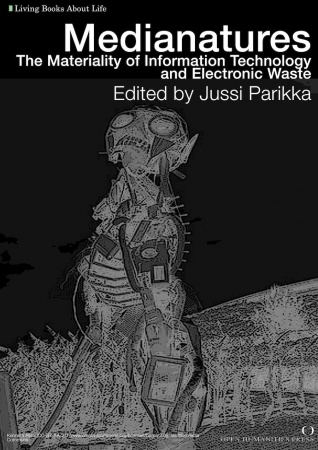Jussi Parikka (ed.): Medianatures: The Materiality of Information Technology and Electronic Waste (2011-)
Filed under living book | Tags: · ecology, ecosophy, electronic waste, energetics, energy, materiality, media ecology, naturecultures, technology

“Medianatures picks up from Donna Haraway’s idea of naturecultures – the topological continuum between nature and culture, the material entwining and enfolding of various agencies, meanings and interactions. Medianatures gives the concept of naturecultures a specific emphasis, and that emphasis is at the core of this living book. It is a useful concept and framework for investigating some of the ways in which our electronic and high-tech media culture is entwined with a variety of material agencies. The notion of ‘materiality’ is taken here in a literal sense to refer, for instance, to ‘plasma reactions and ion implantation’ (Yoshida, 1994: 105) – as in processes of semiconductor fabrication, or to an alternative list of media studies objects and components which are studied from an e-waste management perspective: ‘metal, motor/compressor, cooling, plastic, insulation, glass, LCD, rubber, wiring/electrical, concrete, transformer, magnetron, textile, circuit board, fluorescent lamp, incandescent lamp, heating element, thermostat, brominated flamed retardant (BFR)-containing plastic, batteries, CFC/HCFC/HFC/HC, external electric cables, refractory ceramic fibers, radioactive substances and electrolyte capacitors (over L/D 25 mm)’, and which themselves are constituted from a range of materials – plastics, wood, plywood, copper, aluminum, silver, gold, palladium, lead, mercury, arsenic, cadmium, selenium, hexavalent chromium and flame retardants (Pinto, 2008).” (from Introduction)
Publisher Open Humanities Press
Living Books About Life series
View online (wiki/PDF/HTML articles)
PDF (PDF’d Introduction with hyperlinked articles)
Félix Guattari, Suely Rolnik: Molecular Revolution in Brazil (1986–) [BR-PT, ES, EN]
Filed under book | Tags: · abstract machine, body, brazil, cartography, culture, desire, deterritorialization, emotion, energy, history, love, philosophy, politics, psychoanalysis, schizoanalysis, semiotics, sex, subjectivation, subjectivity, unconscious

“Following Brazil’s first democratic election after two decades of military dictatorship, French philosopher Félix Guattari traveled through Brazil in 1982 with Brazilian psychoanalyst Suely Rolnik and discovered an exciting, new political vitality. In the infancy of its new republic, Brazil was moving against traditional hierarchies of control and totalitarian regimes and founding a revolution of ideas and politics. Molecular Revolution in Brazil documents the conversations, discussions, and debates that arose during the trip, including a dialogue between Guattari and Brazil’s future President Luis Ignacia Lula da Silva, then a young gubernatorial candidate. Through these exchanges, Guattari cuts through to the shadowy practices of globalization gone awry and boldly charts a revolution in practice.
Assembled and edited by Rolnik, Molecular Revolution in Brazil is organized thematically; aphoristic at times, it presents a lesser-known, more overtly political aspect of Guattari’s work. Originally published in Brazil in 1986 as Micropolitica: Cartografias do desejo, the book became a crucial reference for political movements in Brazil in the 1980s and 1990s. It now provides English-speaking readers with an invaluable picture of the radical thought and optimism that lies at the root of Lula’s Brazil.”
Originally published as Micropolítica: Cartografias do desejo, Vozes, Petrópolis, 1986.
English edition
Translated by Karel Clapshow and Brian Holmes
Publisher Semiotext(e), Los Angeles 2008
Foreign Agents series
ISBN 1584350512, 9781584350514
495 pages
Review: Aliocha wald Lasowski (Chimères, 2007, FR).
Publisher (EN)
Publisher (ES, Madrid)
Publisher (ES, Buenos Aires)
Micropolítica. Cartografias do desejo (BR-Portuguese, 4th ed., 1984/1996, added on 2017-2-22)
Micropolítica. Cartografías del deseo (Spanish, trans. Florencia Gómez, Madrid ed., 2006, added on 2013-9-26)
Molecular Revolution in Brazil (English, trans. Karel Clapshow and Brian Holmes, 2008, updated on 2017-6-26)
Micropolítica. Cartografías del deseo (Spanish, trans. Florencia Gómez, Buenos Aires ed., 2nd ed., 2006/2013, added on 2020-11-14)

